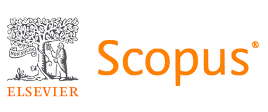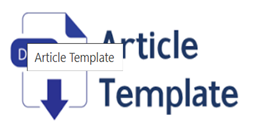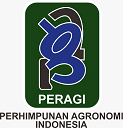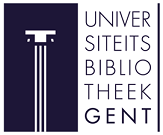Development of Indonesian Organic Agrifood: Certification Process and Issues
Abstract
The global growth of organic agrifood has also reached Indonesia, creating opportunities and challenges for smallholder farmers. This study aims to explore the certification process and identify key barriers to obtaining organic certification for Indonesian agricultural products. Using a qualitative case study approach, data were collected through in-depth interviews with three certified organic farming groups in Central Java—each producing rice, vegetables, or coffee. Data analysis was conducted using descriptive methods and graphical tools such as spider charts. The findings reveal that both pre-certification and certification stages typically require three months, not including land conversion, which may be shortened if prior organic practices are recognized. Major challenges during these stages include business planning, seed availability, group coordination, investment capital, pest management, and contamination prevention. These issues are rooted in limited knowledge and technical skills regarding organic standards and practices. Technological interventions—such as the use of ozone plasma, Internet of Things (IoT), and mobile cold storage—were found to support compliance and productivity, particularly in vegetable farming. However, constraints such as land fatigue, lack of rotation, limited access to organic inputs, and high certification costs persist. The study suggests that improved training, mentoring, institutional support, and access to organic inputs are essential to overcoming certification barriers and strengthening farmers’ participation in organic value chains. These insights offer practical implications for policymakers and stakeholders to promote sustainable organic farming in Indonesia.
Keywords
Full Text:
PDFReferences
AOI (2020). Statistik Pertanian Organik Indonesia 2019, Journal of Chemical Information and Modeling. Bogor: Aliansi Organis Indonesia.
Baird, I.G. (2024) ‘Going organic: Challenges for Government-Supported Organic Rice Promotion and Certification Nationalism in Thailand’, World Development, 173(September 2023), p. 106421. Available at: https://doi.org/10.1016/j.worlddev.2023.106421.
Borrello, M. et al. (2022) ‘Agricultural Landscape Certification as A Market-Driven Tool to Reward The Provisioning of Cultural Ecosystem Services’, Ecological Economics, 193(October 2021), p. 107286. Available at: https://doi.org/10.1016/j.ecolecon.2021.107286.
BSN (2024) Daftar Lembaga Sertifikasi, bsn.go.id. Available at: http://sispk.bsn.go.id/LPK/LembagaSertifikasi?jns=14 (Accessed: 15 October 2024).
Clark, P. and Martínez, L. (2016) ‘Local Alternatives to Private Agricultural Certification in Ecuador: Broadening Access to “New Markets”?’, Journal of Rural Studies, 45, pp. 292–302. Available at: https://doi.org/10.1016/j.jrurstud.2016.01.014.
David, W. and Alkausar, S. (2023) Statistik Pertanian Organik Indonesia, Journal of Chemical Information and Modeling. Edited by M.M. Pius Mulyono, Ninthyas Ekawulandari, Febriana Tambunan, Novia Christiana and N. Sulaiman. Jakarta: Bpress.
David, W. and Ardiansyah (2017) ‘Organic Agriculture in Indonesia: Challenges and Opportunities’, Organic Agriculture, 7(3), pp. 329–338. Available at: https://doi.org/10.1007/s13165-016-0160-8.
Delmas, M.A. and Gergaud, O. (2021) ‘Sustainable Practices and Product Quality: Is There Value in Eco-Label Certification? The Case of Wine’, Ecological Economics, 183(November 2020), p. 106953. Available at: https://doi.org/10.1016/j.ecolecon.2021.106953.
Dlamini, D.F. and Kongolo, M. (2014) ‘Resource Use Efficiency in Organic Vegetable Production: A Case Study of Manzini Region, Swaziland’, Journal of Agricultural Studies, 2(2), p. 52. Available at: https://doi.org/10.5296/jas.v2i2.5958.
Donner, M. et al. (2021) ‘Critical Success and Risk Factors for Circular Business Models Valorising Agricultural Waste and By-Products’, Resources, Conservation and Recycling, 165, p. 105236. Available at: https://doi.org/10.1016/j.resconrec.2020.105236.
Dudin, M.N. et al. (2015) ‘Business Model Canvas as A Basis for The Competitive Advantage of Enterprise Structures in The Industrial Agriculture’, Biosciences Biotechnology Research Asia, 12(1), pp. 887–894. Available at: https://doi.org/10.13005/bbra/1736.
Flynn, K. et al. (2019) ‘An Introduction to Current Food Safety Needs’, Trends in Food Science and Technology, 84, pp. 1–3. Available at: https://doi.org/10.1016/j.tifs.2018.09.012.
Gaspar, P. et al. (2022) ‘What Effect Does The Presence of Sustainability and Traceability Certifications Have on Consumers of Traditional Meat Products? The Case of Iberian Cured Products in Spain’, Meat Science, 187(February). Available at: https://doi.org/10.1016/j.meatsci.2022.108752.
Hadi, A. et al. (2016) Pengembangan Pertanian Organik di Indonesia, Pengembangan Pertanian Organik di Indonesia. Bogor: IPB Press.
Ibanez, M. and Blackman, A. (2016) ‘Is Eco-Certification a Win–Win for Developing Country Agriculture? Organic Coffee Certification in Colombia’, World Development, 82, pp. 14–27. Available at: https://doi.org/10.1016/j.worlddev.2016.01.004.
Ibnu, M., Offermans, A. and Glasbergen, P. (2018) ‘Certification and Farmer Organisation: Indonesian Smallholder Perceptions of Benefits’, Bulletin of Indonesian Economic Studies, 54(3), pp. 387–415. Available at: https://doi.org/10.1080/00074918.2018.1506093.
IFOAM (2023) The World of Organic Agriculture : Statistics & Emerging Trends 2023. Hachenburg: Druckerei Hachenburg PMS GmbH. Available at: https://doi.org/10.5281/zenodo.7572890.
Indriyani, R. and Suri, A. (2020) ‘Pengaruh Media Sosial Terhadap Keputusan Pembelian Melalui Motivasi Konsumen Pada Produk Fast Fashion’, Jurnal Manajemen Pemasaran, 14(1), pp. 25–34. Available at: https://doi.org/10.9744/pemasaran.14.1.25-34.
Jolink, A. and Niesten, E. (2015) ‘Sustainable Development and Business Models of Entrepreneurs in the Organic Food Industry’, Business Strategy and the Environment, 24(6), pp. 386–401. Available at: https://doi.org/10.1002/bse.1826.
Joyce, A. and Paquin, R.L. (2016) ‘The Triple Layered Business Model Canvas: A Tool to Design More Sustainable Business Models’, Journal of Cleaner Production, 135(May), pp. 1474–1486. Available at: https://doi.org/10.1016/j.jclepro.2016.06.067.
Kamau, J.W. et al. (2022) ‘A Holistic Sustainability Assessment of Organic (Certified and Non-Certified) and Non-Organic Smallholder Farms in Kenya’, Environment, Development and Sustainability, 24(5), pp. 6984–7021. Available at: https://doi.org/10.1007/s10668-021-01736-y.
Kuehne, G. et al. (2017) ‘Predicting Farmer Uptake of New Agricultural Practices: A Tool for Research, Extension and Policy’, Agricultural Systems, 156(August 2016), pp. 115–125. Available at: https://doi.org/10.1016/j.agsy.2017.06.007.
Leitner, C. and Vogl, C.R. (2020) ‘Farmers’ Perceptions of The Organic Control and Certification Process in Tyrol, Austria’, Sustainability, 12(21), pp. 1–18. Available at: https://doi.org/10.3390/su12219160.
Lien, G. et al. (2022) ‘Does Risk Management Affect Productivity of Organic Rice Farmers in India? Evidence From a Semiparametric Production Model’, European Journal of Operational Research, 303(3), pp. 1392–1402. Available at: https://doi.org/10.1016/j.ejor.2022.03.051.
Lindawati, L. et al. (2024) ‘Multi-aspect Analysis of Rice Sustainability in the Improvement of Rice Production in North Sumatra Province, Indonesia’, Agro Bali : Agricultural Journal, 7(2), pp. 390–398. Available at: https://doi.org/10.37637/ab.v7i2.1741.
Luna, J.K., Chalit Hernandez, B. and Sawadogo, A. (2021) ‘The Paradoxes of Purity in Organic Agriculture in Burkina Faso’, Geoforum, 127(October), pp. 46–56. Available at: https://doi.org/10.1016/j.geoforum.2021.09.014.
Methamontri, Y. et al. (2022) ‘Factors influencing participation in collective marketing through organic rice farmer groups in northeast Thailand’, Heliyon, 8(11). Available at: https://doi.org/10.1016/j.heliyon.2022.e11421.
Ni Putu Manik Julythiawati and Putu Agus Ardiana (2023) ‘Pengaruh Pelibatan Pemangku Kepentingan dan Tanggung Jawab Sosial Pada Reputasi Perusahaan’, Public Service and Governance Journal, 4(2), pp. 239–246. Available at: https://doi.org/10.56444/psgj.v4i2.1016.
Ningsih, S.R. (2024) ‘Pengaruh Teknologi Terhadap Produktivitas Tenaga Kerja di Indonesia’, Benefit: Journal of Business, Economics, and Finance, 2(1), pp. 1–9. Available at: https://doi.org/10.37985/benefit.v2i1.341.
Novita. (2015) ‘Peran Sertifikasi Organik bagi Petani Berskala Kecil dengan Jangkauan Pasar Lokal’, Jurnal Magister Manajemen, 8(2), pp. 58–91.
Oktarina, Y., Sebagustionnes, A. and Mukhlis, M. (2024) ‘Coffee Farmers’ Obligations Response to 4C Certification in South OKU Regency South Sumatra Province, Indonesia’, Agro Bali : Agricultural Journal, 7(2), pp. 488–499. Available at: https://doi.org/10.37637/ab.v7i2.1788.
Oya, C., Schaefer, F. and Skalidou, D. (2018) ‘The Effectiveness of Agricultural Certification in Developing Countries: A Systematic Review’, World Development, 112, pp. 282–312. Available at: https://doi.org/10.1016/j.worlddev.2018.08.001.
Ramadhan, Y., Najib, M. and Sarma, M. (2020) ‘The Application of Planned Behavior Theory on Millennial Generation Behavior in Purchasing Organic Vegetables’, Jurnal Manajemen dan Agribisnis, 17(2), pp. 117–127. Available at: https://doi.org/10.17358/jma.17.2.117.
Rohe, S. et al. (2022) ‘Forever Niche: Why Do Organically Bred Vegetable Varieties Not Diffuse?’, Environmental Innovation and Societal Transitions, 45, pp. 83–100. Available at: https://doi.org/10.1016/j.eist.2022.09.004.
Shah, P. et al. (2023) ‘Opportunities and Challenges in Food Entrepreneurship: In-Depth Qualitative Investigation of Millet Entrepreneurs’, Journal of Business Research, 155(PB), p. 113372. Available at: https://doi.org/10.1016/j.jbusres.2022.113372.
Solfanelli, F. et al. (2021) ‘Potential Outcomes and Impacts of Organic Group Certification in Italy: An Evaluative Case Study’, Ecological Economics, 187(May), p. 107107. Available at: https://doi.org/10.1016/j.ecolecon.2021.107107.
Sulistyana, P., Mulyo, J.H. and Jamhari, J. (2016) ‘Konsumsi Beras Organik Pada Tingkat Rumah Tangga Di Kota Yogyakarta’, Agro Ekonomi, 25(1). Available at: https://doi.org/10.22146/agroekonomi.17357.
Szocs, E. et al. (2017) ‘Large Scale Risks from Agricultural Pesticides in Small Streams’, Environmental Science and Technology, 51(13), pp. 7378–7385. Available at: https://doi.org/10.1021/acs.est.7b00933.
Taufiq, A. et al. (2023) ‘Pelatihan Kewirausahaan untuk Peningkatan Pendapatan Kelompok Perempuan Usaha Mikro di Desa Larangan Luar Kabupaten Pamekasan’, Jurnal Literasi Pengabdian dan Pemberdayaan Masyarakat, 2(2), pp. 107–116. Available at: https://doi.org/10.61813/jlppm.v2i2.46.
Tridjaja Nyoman Oka (2016) ‘Diversity of Organic Produce in Indonesia’, Journal of Food Science and Engineering, 6(1), pp. 38–42. Available at: https://doi.org/10.17265/2159-5828/2016.01.006.
Truong, V.A., Lang, B. and Conroy, D.M. (2022) ‘When Food Governance Matters to Consumer Food Choice: Consumer Perception Of and Preference for Food Quality Certifications’, Appetite, 168(June 2021), p. 105688. Available at: https://doi.org/10.1016/j.appet.2021.105688.
Wirasta, N. et al. (2024) ‘Penerapan Prinsip-Prinsip Pertanian Berkelanjutan Pada Usahatani Padi Sawah di Desa Cialam Jaya Kecamatan Konda Kabupaten Konawe Selatan’, Jurnal Ilmiah Inovasi dan Komunikasi Pembangunan Pertanian, 3(2), pp. 169–180.
Wirda, Z. et al. (2023) Teknologi Ramah Lingkungan Pada Pertanian Organik: Menuju Pertanian Berkelanjutan. Edited by Azmi Yudia. Yogyakarta: Nuta Media.
Yang, Z., Liu, P. and Luo, L. (2023) ‘Growing Exports Through ISO 9001 Quality Certification: Firm-Level Evidence From Chinese Agri-Food Sectors’, Food Policy, 117(June 2008), p. 102455. Available at: https://doi.org/10.1016/j.foodpol.2023.102455.
Refbacks
- There are currently no refbacks.

























